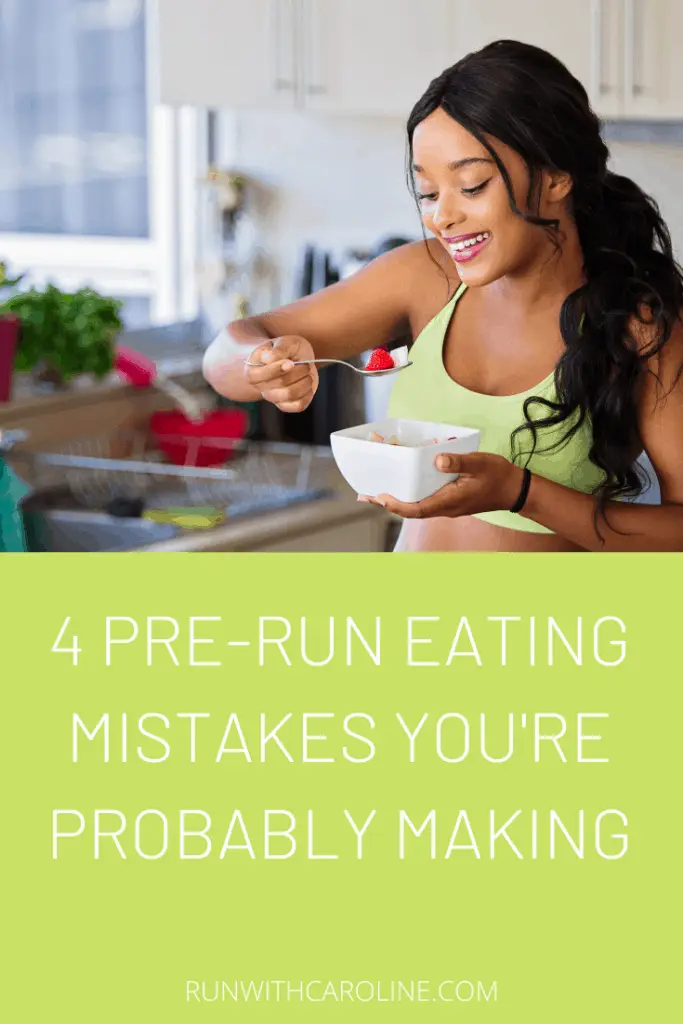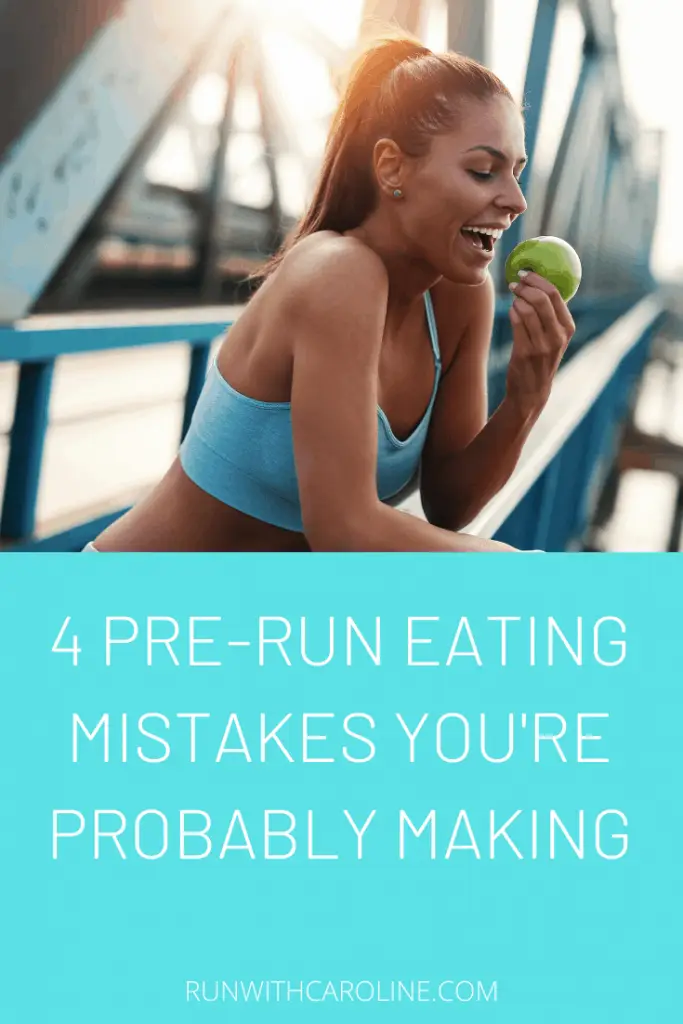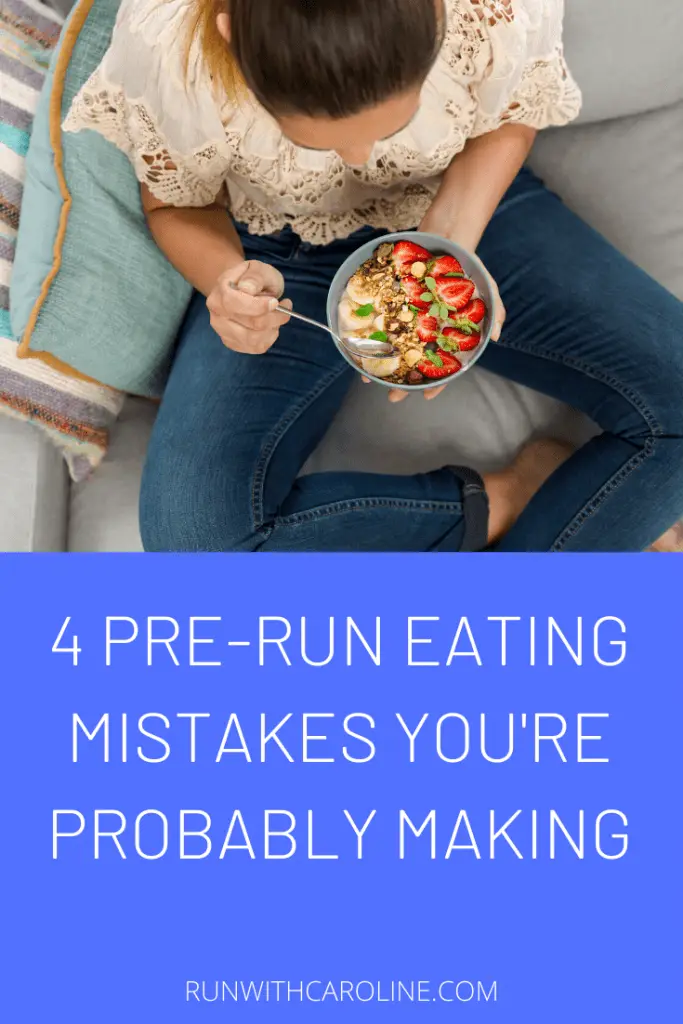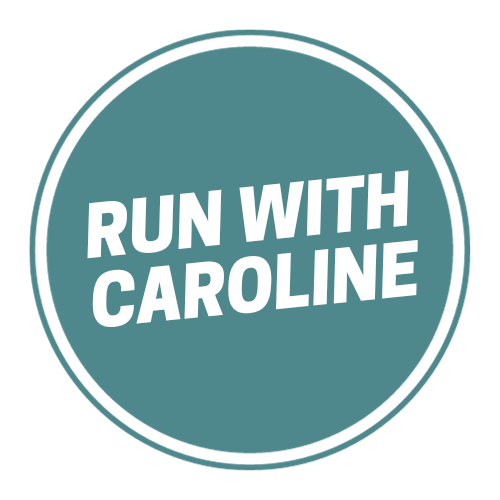Whether you’re training for a 5k or a marathon, the food and fuel you eat can make or break your race. Avoid these pre-run eating mistakes and run your best race.

Not making enough time for breakfast
This is probably one of the most common pre-run eating mistakes. It can be so hard sometimes to get right.
We all know that eating too close to the start of a race can cause a multitude of problems, including stomach cramps, heartburn and unscheduled bathroom trips.
Your digestive system spends a considerable amount of energy breaking down food, especially if the foods are high in fibre.
Eat at least 2 to 3 hours before your race starts. This way your body will use its energy racing rather than digesting food.
A 2014 study found that the timing and composition of a pre-exercise meal is a significant consideration for optimising endurance performance.
It added that eating carb-rich meals prior to endurance exercise have generally been shown to enhance performance. More about that below.
If you’re running a distance like a 5k, your meal should provide 150 to 200 calories.
For longer races, like marathons, you’ll need to eat a meal of 500 calories and up.
Consider eating a fist-sized snack, like a banana or an energy bar, about 60 minutes before the start to keep your blood sugar levels up.
Skipping breakfast, or eating too little before a long race, can cause fatigue and dizziness because your blood sugar levels are too low.
If your race is early in the morning and you don’t want to wake up hours before the race to eat, wake up early, eat then snooze a bit longer.

Eating too much protein, fibre and fat
As a rule of thumb, focus on carb-rich foods before your run then opt for foods high in protein and fat after your run.
Unlike carbohydrates, protein and fat take a long time to empty from the stomach and convert into usable energy. They can also delay the absorption of the carbs you eat.
Eating too many foods high in fibre can cause digestive problems while out on a run. Instead, opt for easy to digest, carb-based meals, like wholemeal bread with peanut butter or a banana on toast.
A 2014 study found that although high fat meals have a beneficial metabolic effect, these effects do not necessarily translate into enhanced performance.
Porridge is a popular breakfast option for many runners as it provides slow-release energy.
When made with rolled oats, porridge can be a little high in fibre, but if it works for you, then stick with it. Try lower-fibre options like Ready Brek if you’re keen to keep porridge as your breakfast mainstay.
Read my what to eat before a run blog for more meal and snack ideas.

Drinking too much water
We all know the pitfalls of not drinking enough water. Headaches, muscle cramps and dizziness, amongst other symptoms. Not to mention a sloshing stomach, full bladder and the need to go to toilet!
Probably one of the more surprising pre-run eating mistakes – believe it or not, drinking too much water can actually be bad for you.
Drinking too much water can also put you at risk of hyponatremia – a dangerous loss of sodium.
Get your fluid intake at least 90 minutes before the start of your run. Then take a final 6 to 8 ounces (about 250 ml) before the race starts.
Your fluid intake also depends on other things like the weather. On very hot and humid takes, increase your fluid intake.
The best sign to tell if your body is dehydrated is to look at the colour of your urine. It should be a light yellow, but not totally clear.
If your urine is dark and cloudy, this is a sign that you are not drinking enough water.

Changing your eating habits
This is one of the pre-run eating mistakes that many runners unwittingly fall for.
It’s hard to tell if your stomach will react well to certain foods, or if it will reject them and cause serious digestive issues. The last thing you want before a race is stomach cramps and diarrhea.
Many runners have become accustomed to certain foods which work well for them during training and on race day.
Stick to the foods which you and your stomach know well. Try not to introduce any new foods in the days leading up to the race or on race day itself. This includes energy gels which are so often handed out during races.
It can be hard to predict what types of energy gels, if any, will be served during the race. So do your research and understand from the race organisers what will be served on the day. The race sponsors may give you a clue.
If this is not an option, travel with your own energy gels and use these during your race.
What eating tips do you follow religiously during your training and before a race? Comment below!
- 5 things I wish I’d known before returning to running - March 3, 2024
- Running 20 minutes a day: Benefits + how to start - January 27, 2024
- How to run your first 2 hour half marathon - January 16, 2024

Deborah Brooks
Friday 14th of February 2020
I know we already follow each other on IG but I am also always looking for more blogs to follow. I agree eating before a run can be tricky. Right now I do oatmeal in some form sometimes with fruit or peanut butter.
Run With Caroline
Saturday 21st of March 2020
It is tricky! And totally depends on your own body. I do love porridge/oat meal in the morning. It's great at releasing energy throughout the day. Peanut butter is my fave too!